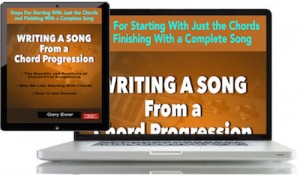Many songwriters love starting the writing process by generating ideas from a chord progression. That’s a legitimate way to write, and it’s very popular. By starting with chords, you lay down what is in effect a landscape upon which you can place other items.
I’ve been working on a new short manual for songwriters who like to start with chords, and I hope to have that ready in the next day or so; keep watching this blog.
Writing songs by starting with the chords actually requires you to think a lot about melodies. That’s because the biggest challenge facing chords-first songwriters is to create a melody that, in a sense, diverts your attention away from chords. Yes, as funny as it seems, one way you know that a chord progression is doing its job is that it fades into the background and allows you to concentrate on other musical elements, like melodies and lyrics.
 If you like starting songs by working out a good chord progression, this eBook will help get you on the right track: “Writing a Song From a Chord Progression” is part of the 10-eBook Deluxe Bundle. Get today’s free deal, Gary’s latest eBook “Creative Chord Progressions”
If you like starting songs by working out a good chord progression, this eBook will help get you on the right track: “Writing a Song From a Chord Progression” is part of the 10-eBook Deluxe Bundle. Get today’s free deal, Gary’s latest eBook “Creative Chord Progressions”
But there’s a danger in chords-first writing, which is that the melody often gets ignored. There is more danger in a chords-first song that the melody is going to sound a bit shapeless and random. The main reason for this is that the voicings you choose for your chords (whether on keyboard or guitar) place certain notes at the top. Those upper notes tend to sound like a kind of melody, but not a very good one.
If you like starting the songwriting process by working out (or borrowing) a chord progression, here are a few things to keep in mind:
- Play through your progression many times, and alter the rhythms you choose to play those chords.
- Each time you play your progression, try to change the voicings. That will allow different notes to be highest ones with each play-through, and you’ll hear more melodic possibilities.
- Change time signature and tempo as part of the songwriting process. Each time you change those things, the musical style changes, and you wind up with more possibilities for a final product.
- Play your progression on as many instruments as you can play. Even if you can’t play them well, try playing the chords on guitar, then ukulele, banjo, accordion, keyboard… anything that will produce chords. This automatically opens up your mind to other stylistic and melodic ideas.
- Try holding some chords longer, other chords shorter. True, most songs will feature a fairly steady harmonic rhythm, but that’s not always the case. So if your chosen chord progression is: C Am F Dm G E7 Am G, try holding some chords for, let’s say, 4 beats, others for 2. That will give you a time signature of 3/2, somewhat unusual but really easy to work with.
Through all those steps, you need to consider the melody you’ll be writing. Remember that good melodies will often have a noticeable shape, made up of up and down patterns (not random motion.) And they make great use of repetition.
So the end result of a chords-first song is that the melodies should be engaging, and should partner well with your lyric. No one should be able to tell that you started with chords. The listeners’ attention should always be on the melodies and lyrics, no matter how the process started.
Written by Gary Ewer. Follow Gary on Twitter.
 “Writing a Song From a Chord Progression” is now available! It’s part of the 10-eBook Deluxe Bundle, and that package is being offered with a SPECIAL DEAL. GRAB THE DEAL
“Writing a Song From a Chord Progression” is now available! It’s part of the 10-eBook Deluxe Bundle, and that package is being offered with a SPECIAL DEAL. GRAB THE DEAL











That’s really good advice. As a “chord first” songwriter one thing I find useful to escape the obvious melody is to play my progression on guitar in an open tuning – sometimes open tunings I’ve just made up for that purpose.
The different chord voicing forces me to think differently about the melody, and then when I put it back into more common voicings I’ve got something a bit more interesting to work with.
Wondering why you prefer to change the chord voicings from open and lush back to common voicings in standard tuning. Playing live without having a different guitar for every song is a possible reason I think. Other than that
Quite often I do leave it in open tuning, but if it’s going to be arranged for a band rather than singer/songwriter style then I’ll usually revert to common tuning for the rhythm guitar parts.
Do you believe that songwriters who produce good, effective, popular songs starting with chords then melody tend to have a gift for melody? If there were any single talent within the craft of songwriting, the talent for writing melody has to be near or at the top of the list do you agree?
Hi Charlie:
Yes, I quite agree. The problem with chords-first songwriting is that the melody often either gets ignored (i.e., too much attention paid to chords), or the writer gets stuck because they fixate on the top notes of the voicings they choose. In any case, the melody is, to me, crucial to making a song hit and stick.
-Gary